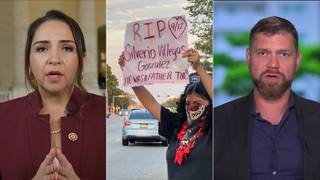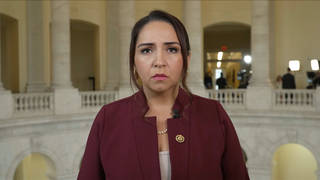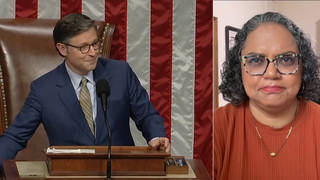
A historic number of women of color are running for public office in today’s election. At least 255 women are on the ballot as congressional candidates, including a record number of women of color. In Georgia, Stacey Abrams hopes to become the state’s first black governor—and the country’s first black woman governor. Meanwhile in New Mexico, Deb Haaland could become the nation’s first Native American woman to serve in Congress. Amid a rash of racist ads by Abrams’s opponent Brian Kemp, there is something “deeply transformational about the electoral organizing and the campaign that Stacey Abrams represents,” says Aimee Allison, president of Democracy in Color and founder of She the People.
Transcript
AMY GOODMAN: This is Democracy Now! I’m Amy Goodman, as we turn to the historic number of women of color running for public office in today’s election in the United States. Motivated in part by President Donald Trump’s constant derogatory remarks against women and the numerous claims that he committed sexual assault, at least 255 women are on the ballot as congressional candidates, including a record number of women of color. In addition to 59 black female congressional candidates nationwide, in Georgia, Stacey Abrams hopes to become Georgia’s first black governor and the country’s first African-American woman governor.
This follows major advances in the primaries earlier this year, when Democratic Socialist Alexandria Ocasio-Cortez won an overwhelming victory against top Democrat Congressmember Joe Crowley in the Bronx and Queens for a House seat. She could become one of the youngest women ever elected to Congress. Two Muslim women, Palestinian American Rashida Tlaib in Michigan and Somali American Ilhan Omar in Minnesota, also won their Democratic Party primaries for seats in the House. Both women are running in strongly Democratic districts Meanwhile in New Mexico, Deb Haaland could become the nation’s first Native American woman to serve in Congress.
For more, we go to Atlanta, Georgia, where we’re joined by Aimee Allison, president of Democracy in Color, founder of She the People.
Aimee, it’s great to have you with us. You were going to be in New York, but I can see you could not resist. You wanted to go where people—
AIMEE ALLISON: I could not. I mean, this is Grant Park 2008. It’s the race that everybody’s watching.
AMY GOODMAN: So, talk about what you’re seeing right now in Georgia, what could be history-making.
AIMEE ALLISON: You know, it isn’t just that Stacey Abrams would make history as the first black woman governor, although that’s very significant. It’s how she ran her campaign. From the moment she declared her candidacy in Albany, Georgia, last summer, she has had organizers on the ground and a simple path to victory that turns the playbook the Democratic Party has used for decades on its head. She looked at the unengaged people of color in the state of Georgia, a state that’s nearly a majority people of color, and she said, “If we have a strategy of working with the community and registering and engaging people of color and leading deeply into the base”—black women are 1.1 million of the voters that will come to the polls today—”we have a path to victory to turn the state blue.”
And I tell you, the excitement on the ground is palpable. I was here for early voting. Every single black millennial that I have met in the course of working and traveling around Georgia has already voted. And I think, just like in the primary here in Georgia, the pollsters are going to be surprised. I’m very, very positive.
And at the same time, Brian Kemp, her opponent, has undue power. He’s never stepped down as secretary of state. So, the voter suppression tricks and the cheating on the part of the Republicans is a very real barrier that we’re going to continue to be aware of here in Georgia and try to overcome.
AMY GOODMAN: So, let’s talk about—let’s talk about some of what Kemp has done. And people have to understand, this is highly unusual. I mean, I have seen Republican after Republican now on the cable networks, who often, you know, are there parroting what Trump says, saying Kemp, Brian Kemp, who’s running against Stacey Abrams, has gone a step too far. Brian Kemp, who’s the secretary of state of Georgia—means he’s in charge of the elections—also running for governor. He has been targeting voters with robocalls featuring false claims about Abrams. In this call, Abrams is accused of stealing the election with votes from undocumented immigrants.
KEMP CAMPAIGN ROBOCALL: Radical Stacey Abrams is so extreme that she wants to allow illegal immigrants to vote in this election. We can’t let her steal this election. It’s up to you to stop her!
AMY GOODMAN: And then there is this racist robocall from some white supremacists. You know, Oprah Winfrey was campaigning there in the last week, of course joining Stacey Abrams on the campaign trail in Marietta, Georgia, days before one of this country’s most talked-about races.
ROBOCALL: This is the magical negro, Oprah Winfrey, asking you to make my fellow negress, Stacey Abrams, the governor of Georgia. Years ago, the Jews who own the American media, saw something in me: the ability to trick dumb white women into thinking I was like them and to do, read and think what I told them to. I see that same potential in Stacey Abrams. Where others see a poor man’s Aunt Jemima, I see someone white women can be tricked into voting for, especially the fat ones.
AMY GOODMAN: “A poor man’s Aunt Jemima.” I mean, this is horrifying. And we saw something similar in Florida that targeted—this racist robocall that targeted Andrew Gillum, who’s also running for governor.
AIMEE ALLISON: I want to say that Brian Kemp, it’s not illegal for him to maintain secretary—being the secretary of state, but it’s unethical. And he’s a Trump acolyte who feels emboldened not only to be openly racist in his campaigning. Instead of talking about the issues, like Medicare expansion or education or criminal justice, he’s using racism openly to try to get people to the polls here in Georgia.
The thing is that even though Stacey Abrams has to face and overcome this, that there is something really beautiful that’s happening in Georgia. Her campaign, which is multiracial and aspirational, is the one of the country’s bright spots in the country. So, despite the fact that white nationalists are backing Brian Kemp and he’s using racist language, there’s something more powerful and, I think, deeply transformational about the electoral organizing and the campaign that Stacey Abrams represents. And so, I think that positive message is going to overcome this racism in the end.
AMY GOODMAN: I wanted to ask you about a close race in Georgia’s 6th Congressional District. You know, that’s where Oprah was campaigning also, in Marietta. Incumbent Republican Congressmember Karen Handel, she was one of—the very controversial head of the Komen Breast Cancer Foundation who decided to end funding for Planned Parenthood. Planned Parenthood and many organizations and leaders around the country said this is outrageous. She was forced out of Komen, but then she ran in the Ossoff race, the most expensive race in U.S. history, in a special election. And now she’s fighting to maintain that seat, running against Democratic challenger Lucy McBath, who’s a gun control activist, whose 17-year-old son, Jordan Davis—she’s African-American—Jordan was fatally shot by a 49-year-old white man at a gas station in 2012. He was in a car. He was a teenager with other teenagers. And the men said they were playing loud music in their car, parked, and he shot into the car and killed Jordan. Lucy McBath was galvanized to run for office after the February massacre at Marjory Stoneman Douglas High School in Parkland, Florida. And this is a close race, Aimee.
AIMEE ALLISON: It’s very close. Let’s just remember, back in 2017, when Jon Ossoff, in the special election, had a crowded field and an opportunity to take that seat for the Democrats. He made this mistake a lot of Democrats did, which was to say, “I need to run a campaign that appeals to white moderates.” He assumed that it was a moderate district and that was the winning strategy. He had a lot of money. You said it was an extensive race. He had over $30 million. But he made a fatal error, which is to overlook, in the primary, the strongest, most loyal Democrats: black women and black men. And by the time he faced off with Karen Handel, he was overwhelmed by the Republican vote.
But Lucy McBath’s dynamic is really different in this race, because, for one, there is an historic outreach in places like '06—Georgia ’06 race, in terms of getting voters who don't vote normally, who are infrequent voters, out to the polls. And so there has been a registration and voter engagement that that district has not seen in the past. And I think that’s going to be transformational. I certainly think Lucy McBath has a great chance of besting Karen Handel tonight.
AMY GOODMAN: Who else are you watching, Aimee, around the country?
AIMEE ALLISON: Well, if you look—you mentioned in your introduction the historic number of women of color. And I just want to note, women of color who are on the ballot as congressional candidates, one of three women who are on the ballot are women of color, and the vast majority of them did not have Democratic support. So, as a group, they’re most likely to face challenges by other Democrats. So there’s a very big problem institutionally with state and national parties supporting the most loyal base.
But I’m looking at places where there’s a real opportunity, flip opportunity, for women of color. So, for example, in New Mexico, Xochitl Torres Small has a very, very good chance of taking her district and winning that for the Democrats. I’m looking at Gina Ortiz Jones, who’s down in Harris County in Texas, who has a very good chance, is running a very strong campaign, a Filipina veteran down in Texas. I’m looking at some of the races—there’s seven in all—where you have women of color who are facing Republicans, but campaigning and inspiring a multiracial progressive coalition that may be strong enough to motivate the number of voters that it’s going to take to win.
AMY GOODMAN: You also have Native American congressional candidate in New Mexico Deb Haaland, who would become the first Native American woman in Congress.
AIMEE ALLISON: She’s an impressive champion for a progressive, broad-based justice agenda. I remember watching her speech the night that she won the primary, and she said, “This is a victory for working people, and it’s a victory for Indian country.” I think this is a year that will be noted in history, that the Native American community, in particular women, who were very strong progressives, their leadership is being recognized by the country. And I think Deb Haaland is a perfect example of a person with vision and with heart. I mean, these are a group of leaders who are different, a different kind of leader, who are leading with love and a commitment to justice and who, I believe, will govern with their full humanity in view. It’s very inspiring. And I think both Deb Haaland and Sharice Davids, both of those Native American leaders, would transform what happens in terms of the agenda in Congress.
AMY GOODMAN: Paulette Jordan in Idaho would be the first U.S. Native American governor if she wins today.
AIMEE ALLISON: That’s right.
AMY GOODMAN: Well, Aimee Allison, I really look forward to talking to you tonight. We’re speaking today, and it’s so calm. You’re in a studio in Atlanta. I am hoping we can even hear you tonight, because you’re going to be at the what? You’re going to be with Stacey Abrams in Atlanta.
AIMEE ALLISON: That’s right.
AMY GOODMAN: And I can’t imagine how loud it’s going to be. You’re going to be on the phone, but we’re doing a 6-hour special, and you’ll be one of the people who we’re going to be turning to to look at what’s happening in this country. And I hope folks tune in at 7:00 Eastern Standard Time to 1:00 in the morning, when Democracy Now! joins with The Intercept in this historic special broadcast. Aimee, thanks so much for being there, president of Democracy in Color and founder of She the People.
This is Democracy Now! When we come back, we’re going to Colorado, a very interesting—well, these aren’t people running; these are ballot initiatives. The fossil fuel industry is pouring tens of millions of dollars in to defeat some of the people’s initiatives on the ballot. And then we’re going to hear about the possible enfranchisement of more people than we’ve ever seen since women got the right to vote, and it’s Amendment 4 in Florida. Stay with us.











Media Options